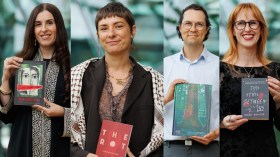Madison Griffiths’ Sweet Nothings is a lyrical meditation on female university students who have consensual relationships with their older male tutors and lecturers. Griffiths explores this dynamic through the intertwined stories of four women – Rose, Blaine, Cara and Elsie – weaving in her own considerable reflections.
The fallout of these relationships can vary between the subtle and the devastating. Although voluntary, and although based on genuine desire and even love, the stories Griffiths discusses feature feelings of being used and objectified. The young women may not fully recognise the extreme power imbalance in their relationship until it’s over. They often find that they are one of many students to have been seduced by this man – that he has a ‘type’, and his students are reduced to being another notch in the bedpost.
Then, there are stolen ideas, lost professional references, having to change majors to avoid being tutored by a lover and the whiplash of overwhelming cruelty in the classroom to better keep the questionable relationship a secret. There can be an eventual awkwardness of being colleagues with this man and the ethical discomfort of watching him groom another young woman.
More broadly, these relationships get in the way of the pedagogical goals of the university. When female bodies are given primacy over their ideas in the classroom, there’s a corruption of the purpose of this classroom – which is to learn. Griffiths asks, “Am I prudish to insist that women just be left alone?” She rightly points out too that good teachers know how to encourage their students and get to know them without compromising the platonic nature of their relationship. This is a gift that students will not get elsewhere – another person’s investment in their intellectual development without distractions or strings attached.
These latter arguments feel fresh in the ongoing post-#MeToo discourse about power imbalances in relationships and predatory industries. How the work of these industries – how teaching, intellectual curiosity and academic rigour – may suffer from the centrality of desire is not often considered.
Though non-fiction, Sweet Nothings is told in a novelistic mode reminiscent of Lisa Taddeo’s Three Women. This stylistic choice is highly immersive – the reader is privy to the thoughts of each subject, their recollections of sensory information and scenery, their general subjective impressions of past events. The trade-off with this evocation is that readers are not privy to how the author gleaned this information.
We don’t ‘see’ (very often) the conversations between author and subjects. It is a matter of personal preference how much of a non-fiction story’s creation should be revealed to the reader. The effect, though, is vivid insights into specific scenes and moments. The level of detail rendered in these moments is impressive – it takes a long time to forge the kind of intimacy with subjects that Griffiths captures on the page.
While the book takes us into the heads of each character, we hear little of their voices. The use of quotation is sparse, which makes the present day analyses of the smart, reflective subjects feel distant. At times, the text feels overwhelmed by Griffiths’ own idiosyncratic style of prose, which draws heavily on metaphor and simile. A subject’s panic attack, for example, is described: “as if her big ticker … sank in the carpet of her chest”. This writing is evocative and poetic, but feels like a missed opportunity to convey such an intense experience in a way it would be described by the person who experienced it.
Read: Book review: Autocorrect, Etgar Keret
This is a fairly minor point because, while Griffiths’ style may take time to get used to, its cadences eventually lull the reader into her serious, expressive meditation. The book navigates the complexities of imbalanced – but ultimately consensual and adult – relationships with ethical clarity and stunning poetry.
Sweet Nothings, Madison Griffiths
Publisher: Ultimo
ISBN: 9781761151859
Format: Paperback
Pages: 320pp
Release date: 1 July 2025
RRP: $36.99






